Yokoluş İsyanı: “We adopt Extraordinary Demonstration Methods”
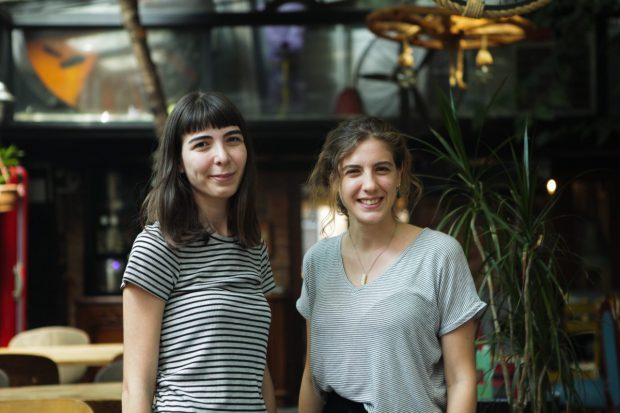
Yokoluş İsyanı is the Turkey leg of the London based global movement Extinction Rebellion, which was initiated with civil disobedience acts against the climate crisis, extinction of species, loss of biological diversity and social and economic downfall. Aiming to draw attention on the climate crisis with extraordinary acts involving music and art, Yokoluş İsyanı intends to carry out demonstrations suitable for Turkey's atmosphere along with their global climate demonstrations.
Having their first demonstrations in Turkey simultaneously with other climate activists in the world in Beşiktaş, Yokoluş İsyanı aims to go beyond the usual demonstration methods. Yokoluş İsyanı exhibited an art performance in April in Kadıköy and they created an iron construction. They named the performance “Hurdahaş”, which means destroy and destruct. This structure was covered with transparent tracing paper and words about climate crisis were written on the papers with an art performance. The demonstration of Yokoluş İsyanı received positive reactions from the audience when the writings were done. They say that they will continue to arouse attention to the climate crisis with creative demonstrations.
We interviewed with the climate activists Elif Ünal and İren Bıçakçı from Yokoluş İsyanı about the global and local climate movements, the share of roles of the state and the role of the media in climate crisis.
How do you define the movement of Yokoluş İsyanı?
Elif Ünal: Yokoluş İsyanı, indifferently from other environment organisations and non-governmental organisations, does not have a hierarchical structure. We are striving for destroying the hierarchy in the decision processes by working in the order of horizontal organisation. Thus, we aim to generate more creative and attractive works.
“Our Primary Demand is the Truths to be told about the Climate Crisis”
How have you come together as Yokoluş İsyanı? What are your objectives, what are your goals?
Elif Ünal: In the period when Extinction Rebellion commenced its activities in London, we thought that we should translate the developments experienced into Turkish. We opened a Twitter account and started to report the developments in England. Then, people started to join us and ask how they could contribute. We were about 10 people who desired to do something about the climate crisis. We thought that it would be greatly unfair if we did not take actions together and we initiated. We made an open call to everyone. People wanted to give support with various production methods such as translation and design. Even though not frequently spoken, people are seeking people who they can speak about their concerns on the climate crisis. Actually, we initiated a movement with these concerned people coming together.
İren Bıçakçı: Our primary demand is to declare emergency and that the governments to tell the truth. We are encountering a very serious climate crisis but no one is aware of this and no one is taking action as it is not pronounced as climate crisis.
Our second demand is to achieve net zero carbon emissions by 2030. Actually this demand was determined as 2025 in England. We want a transition plan for transition to zero carbon to be prepared, this plan to be audited by citizens, and the auditing to be strengthened.
What is your relationship with Extinction Rebellion in London?
Elif Ünal: We established a contact with the team in England. We said that we are in Turkey and we started to do something about the climate crisis. They helped us a lot. They shared their training packages and the documents to lead us the way. We are in a nice communication with the movements in other countries.
“Our Objective is to push the Limits”
Extinction Rebellion comes up with acts of civil disobedience. What are you planning to do in Turkey?
Elif Ünal: Movements and capacities of action of every country are different. For example, they can close a square for 10 days in England. They can occupy the assembly or perform civil disobedience acts that we may find extreme. For example, demonstrators in England may stick themselves to building entrances with glue. According to the laws, the police cannot respond against a person who is stuck with glue, for 1.5 hour. They tried to perform the same demonstration in France. The demonstrators stuck themselves at the entrance of a petrol company and the police sprayed teargas at the demonstrators from a distance of 5 cm.
We want to be on the street in Turkey. We want to reach people, to be together with them… We do not adopt the methods of demonstration that may give disturbance to other people. We want to organise creative demonstrations for portraying the climate crisis. We want to express ourselves with art, music and demonstrations in which people can feel belonged. Our purpose is to draw attention, and to do this by pushing the limits as much as possible.
You have a campaign named “Zero Future” with other environment organisations in Turkey. Would you please tell about the campaign?
İren Bıçakçı: We are open to all movements that give out a voice for the environment. We are in the preparation phase with various environment movements and non-governmental organisations for a campaign named “zero future”. We are co-organising this campaign with Yeryüzü Derneği, Kuzey Ormanları Savunması, 350.org, Parents For Future, Antikapitalistler, Fridays For Future, Genç Yeşiller, Yeşil Düşünce Derneği and Buğday Derneği.
The campaign starts with a social media campaign. It will be a social media campaign named with a hashtag “#2030daben” open for the participation of everyone. We are thinking about it to be a campaign that the hopes, goals, expectations and disappointments of people in 2030 will be demonstrated.
After then, for five weeks, five themes regarding the consequences and reasons of climate change will be worked through. The themes will be deforestation, fossil fuel and air pollution, climate justice, food and plastic in these weeks. Social media posts, movie screening, panels, presentations and similar activities will take place regarding these themes. We would like to draw attention of people and inform them about the issue of climate crisis. Afterwards, a general strike will take place on September 20. On this day of strike, the big strike of children will take place, but we expect everyone’s participation. We project that day to end with a festival.
“Those who have the Biggest Share in the World’s Pollution are Adults”
Greta Thunberg’s homework found its response all over the world as well as in Turkey. Can the awareness to rise with the children’s looking out for the planet be a way to overcome the climate crisis?
Elif Ünal: School strikes for climate started with Greta. Greta, when she was 15, took a placard in her hand, went in front of the parliament, started with saying “You are not doing anything about the climate crisis, so I am not going to school, I am on a strike”, and reached millions this way.
After Greta, students everywhere started going out on the streets and started making their voices heard. They said “We have a right to the future and we claim it.” It is a very rightful demand. Now those who have the biggest share in the world’s pollution are adults. The children going out on strikes do not have a share but they will have to face it. But hope rises on everyone with the strike of children. That is Greta who gives the answer to this: “I don’t want you to be hopeful. If you appreciate what I am doing, I want you to take action.”
“The Number of Children in Turkey, where Awareness on Climate Crisis is Low, is not Few”
While the climate strike of children in the world makes an impression, and millions of students go out on the streets, why do the demonstrations in Turkey remain silent?
Elif Ünal: There are too many children in Turkey too. In İzmir, Antalya, Lüleburgaz, İstanbul and Diyarbakır, children go out on school strikes for the climate, and they sacrifice one day in their educations.
It started as one person when Greta came out, and she carried with her everyone encouraged from her confidence and courage, but it cannot be expected from everyone to be Greta.
The children here are doing their best. They are not going to schools and sacrificing from their education. They are going out on strikes consistently every Friday and trying to explain the matters about climate crises to their friends in school. This situation also causes them to stand against their teachers from time to time. In fact, they are at a point that they have taken a greater load than they can take. So, what can we do? We can contribute to the strike of the children and make it heard. Instead, we should go out and do something, which will only then have a meaning. If no one supported Greta but expected her to achieve success, then she would not have succeeded either. All journalists, media organs, politicians must now stand behind the children going out on strike in Turkey, and support them not only with discourses but also with actions.
İren Bıçakçı: The number of children in Turkey, where awareness on climate crisis is so low, is definitely not few. Even that they go out on strikes as they see no support from their schools deserves admiration. We cannot see such courageous act with the adults. I think that children have much more courage than us.
“The European countries are discussing solutions for climate crisis. While France and Germany are planning to get environment tax on the flight tickets, England declared emergency on climate.”
What do you think about the top level authorities in Turkey not taking any steps for the climate crisis?
Elif Ünal: Governments all around the world stand far from finding realistic solutions about the climate crisis. Some countries have accepted the state of emergency on climate. Actually, it is not also enough that they say it. We are talking about the European countries, and the European countries have a very big responsibility on the current conditions. The concept that we name as the climate justice emerges from here. The reason that the movement was initiated in London is this. (The fact that the Industrial Revolution started in England.)
England declared state of emergency on climate. Considering Turkey, there is no such declaration. It is not brought up to the agenda of the assembly, it is not taking place in the electoral discourses of the political parties. There is a seeking of concealing and hiding. When we think about what Turkey can do about this, it is not a solution to declare emergency but this must be the first step. The people have the right to know what they have encountered. After this is done, transition plans must be implemented for climate by the municipalities on local basis.
We are still dealing with Article 45 in Turkey. It has now been withheld, but it is spoken that it will come up to the agenda again. Article 45, which took place in the Draft Bill on Mining, allowed the coal powered thermal plants operating without flue gas filter to operate 2 years more. Whereas we should close the thermal plants, we are saying that we should use them without flue gas filters.
After transition is done, we demand that suitable jobs are created for the employees in thermal plants so that they do not get affected from the transition, whereas the employees being from the centre of the transition.
For example, the international unions in Europe demand 1 million jobs for climate. It must be so in Turkey too. By providing new job opportunities, we want a transition in which the employees are at the centre of the transformation and their rights are guaranteed.
The Guardian announced that they will use more clear expressions such as “climate crisis” instead of “climate change”. How should the role of media be in climate crisis?
İren Bıçakçı: The media, as well as the government, must speak the truths of the crisis. It should be explaining what we can do to stop it.
Elif Ünal: Regarding the climate crisis, successive reports are published as “Climate crisis is coming”. These are manifested as prospective projections. For being sensational, it is said “1 million species will be extinct 10 years later”. However, the climate crisis is happening now. This must be underlined. If people know what is happening now, the will to take action will increase.
Now we experience hurricanes in Turkey. Last year, a 13-year-old seasonal farm worker Berivan Karakeçili lost her life due to the sheet falling from the roof on her head because of the hurricane that happened in Antalya. Hurricanes did not use to occur in Turkey before. The reason that they do now is the climate crisis. While the newspapers report hurricane news, they should explain why the hurricane happened. They happen, because there is a climate crisis. The message should be communicated as this is not a natural disaster.
If we are talking about the fact that the foods are expensive, and about the discount lines, the reason is climate crisis. Because now it is more difficult to produce food. It hails in the middle of summer. This causes the producers to fail to sell their products, and they get more expensive. The media organs must show that the climate crisis has an aspect that affects everyone’s life.

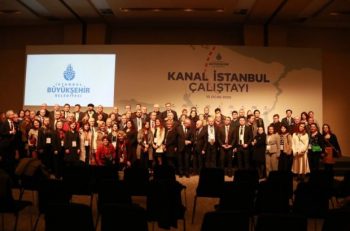

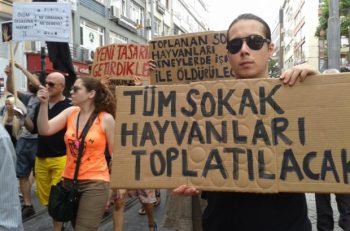

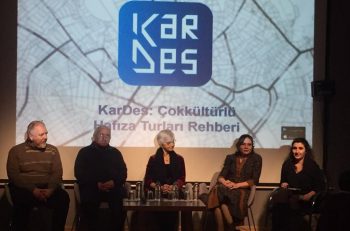
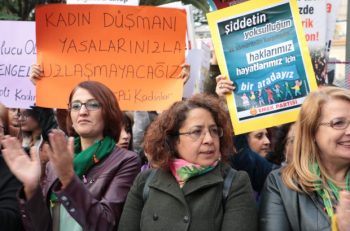

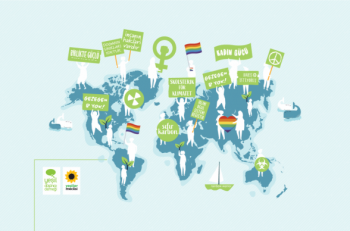


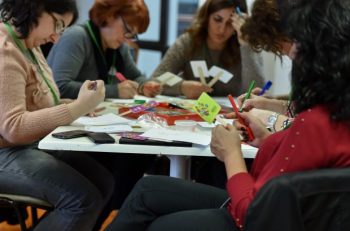
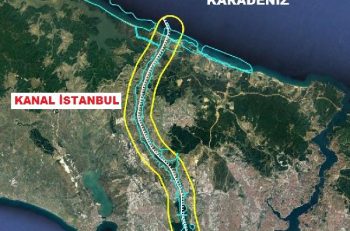
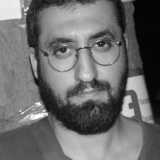
Bizi Takip Edin